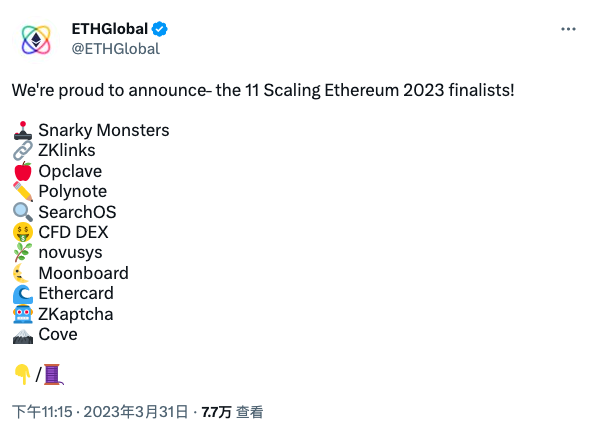สินค้าคงคลังของ 11 ETHGlobal "Scaling Ethereum 2023" โครงการสุดท้ายของ Hackathon
เมื่อวันที่ 31 มีนาคม แฮ็คกาธอนธีม "Scaling Ethereum 2023" ซึ่งจัดโดย ETHGlobal ได้สิ้นสุดลงอย่างเป็นทางการ
หน้าแรกที่ชนะ:

Snarky Monsters
หน้าแรกที่ชนะ:https://ethglobal.com/showcase/snarky-monsters-1 ei 3d
Snarky Monsters เป็นเกมออนไลน์สไตล์โปเกมอน ลักษณะเด่นที่สุดของเกมนี้คือ
ปัจจุบัน เกมที่อยู่บนเครือข่ายทั้งหมดทำงานช้ามาก เพื่อแก้ปัญหานี้ Snarky Monsters เลือกที่จะทำการคำนวณแบบออฟไลน์ ด้วยการใช้ความมุ่งมั่นในการเข้ารหัสเพื่อสร้างช่องทางสถานะของการสุ่มที่ตรวจสอบได้ ผู้เล่นของ Snarky Monsters สามารถโต้ตอบกับ NPC และผู้เล่นอื่น ๆ ได้ด้วยเวลาแฝงที่ต่ำมาก
หน้าแรกที่ชนะ:
ZKlinks
หน้าแรกที่ชนะ:https://ethglobal.com/showcase/zklinks-scalable-l2-referral-link-tracking-6 mna 3
ZKlinks เป็นระบบติดตามลิงก์ที่แนะนำโดยอิงจากหลักฐานที่ไม่มีความรู้ (zero-knowledge proof) เมื่อเปรียบเทียบกับบริการดั้งเดิม เช่น bit.ly แล้ว ZKlinks มีข้อดีดังต่อไปนี้
หนึ่งคือการปกป้องความเป็นส่วนตัว ZKlinks ใช้การพิสูจน์ที่ไม่มีความรู้เพื่อให้ได้ความเป็นส่วนตัวที่แข็งแกร่งยิ่งขึ้น ระบบการติดตามลิงก์อ้างอิงแบบดั้งเดิมมักจะกำหนดให้ผู้ใช้แบ่งปันข้อมูลส่วนบุคคล เช่น ที่อยู่อีเมลหรือบัญชีโซเชียลมีเดีย ในขณะที่ ZKlinks อนุญาตให้ผู้ใช้พิสูจน์การอ้างอิงโดยไม่ต้องเปิดเผยข้อมูลส่วนบุคคลใดๆ ซึ่งหมายความว่าผู้ใช้สามารถแนะนำเพื่อนและครอบครัวได้โดยไม่ต้องกังวลเกี่ยวกับความเป็นส่วนตัว กำลังรั่วไหล
อย่างที่สองคือ ปลอดภัยกว่า ระบบการติดตามลิงก์การอ้างอิงแบบดั้งเดิมมักเสี่ยงต่อการถูกแฮ็คและการละเมิดความปลอดภัยอื่น ๆ ซึ่งอาจส่งผลต่อข้อมูลส่วนบุคคลของผู้ใช้และผู้อ้างอิง ด้วยการใช้ระบบพิสูจน์ความรู้เป็นศูนย์ ZKlinks สามารถมั่นใจได้ว่าข้อมูลการอ้างอิงทั้งหมดมีความปลอดภัยและไม่สามารถเข้าถึงได้โดยบุคคลที่ไม่ได้รับอนุญาต
หน้าแรกที่ชนะ:
Opclave
หน้าแรกที่ชนะ:https://ethglobal.com/showcase/opclave-94 def
Opclave เป็นกระเป๋าเงินสัญญาอัจฉริยะที่ไม่ต้องใช้วลีช่วยจำและรองรับ Apple Face-ID และ Touch-ID
Opclave ได้รับการพัฒนาโดยทีม Istanbul University İTÜ Blockchain Club โดยมีนักพัฒนาทั้งหมด 5 คน หนึ่งในนั้นคือ 0x Dogan.eth ซึ่งเป็นหนึ่งในผู้ร่วมสนับสนุน Connext Network แนวคิดหลักของ Opclave คือการเปลี่ยนอุปกรณ์ Apple, iPhone และ Macbooks ให้เป็นกระเป๋าเงินฮาร์ดแวร์ และเริ่มการทำธุรกรรมจาก Apple Secure Enclave ซึ่งเป็นสภาพแวดล้อมการดำเนินการที่เชื่อถือได้ เพื่อความปลอดภัย กระเป๋าเงินที่มีฟังก์ชันไบโอเมตริกซ์นี้ไม่เพียงลดความซับซ้อนของกระบวนการใช้กระเป๋าเงิน แต่ยังย้ายประสบการณ์การทำธุรกรรมจาก Web2 ไปยัง Web3 ซึ่งสามารถเพิ่มจำนวนผู้ใช้ซ้ำและดึงดูดผู้ใช้ที่ภักดีมากขึ้น
สำหรับข้อมูลเพิ่มเติม โปรดดูที่: "หน้าแรกที่ชนะ:》
Polynote
หน้าแรกที่ชนะ:https://ethglobal.com/showcase/polynote-kbmcg
Polynote เป็นเครื่องมือเอกสารที่เป็นมิตรต่อความเป็นส่วนตัวซึ่งสร้างขึ้นจากฐานข้อมูล Web3 Polybase โปรแกรมแก้ไขข้อความรองรับการทำงานหลายอย่าง เช่น การอัปโหลดภาพ การเน้นข้อความที่สำคัญ การตั้งชื่อ และการบล็อกโค้ด
หน้าแรกที่ชนะ:
SearchOS
หน้าแรกที่ชนะ:https://ethglobal.com/showcase/searchos-gxx 7 v
SearchOS เป็นเสิร์ชเอ็นจิ้น Web3 ที่ช่วยให้ผู้ใช้สามารถโต้ตอบกับแอพพลิเคชั่นหลายตัวในหลายเชนได้อย่างง่ายดาย เช่น การตรวจสอบยอดคงเหลือในกระเป๋าเงินและราคาแบบเรียลไทม์บน Ethereum mainnet, Polygon, Gnosis Chain หรือ (ข้ามเชน) การส่ง, บริดจ์, แลกเปลี่ยน โทเค็น
จากข้อมูลของ SearchOS หนึ่งในปัญหาปัจจุบันในอุตสาหกรรมนี้คือเว็บไซต์ แอป และเครื่องมือใหม่ๆ ได้รับการแนะนำเกือบทุกวัน และแม้ว่าสิ่งนี้จะเป็นธรรมชาติของวิวัฒนาการของอุตสาหกรรม ผู้ใช้ต้องนำทางผ่านเมนูต่างๆ มากมายและเฉพาะ อินเทอร์เฟซสามารถจัดการธุรกิจ Web3 รายวัน วิธีการแยกส่วนนี้เพิ่มเกณฑ์รายการสำหรับผู้ใช้ใหม่
หน้าแรกที่ชนะ:
CFD DEX
หน้าแรกที่ชนะ:https://ethglobal.com/showcase/cfd-dex-and-flash-trillions-ad 666
ตามชื่อที่แนะนำ CFD DEX คือการแลกเปลี่ยนแบบกระจายอำนาจที่เน้นไปที่สัญญาซื้อขายส่วนต่าง (CFD)
สัญญาส่วนต่างจริง ๆ แล้วเป็นสัญญาเกี่ยวกับส่วนต่างราคาที่สรุประหว่างผู้ซื้อและผู้ขาย สัญญากำหนดเงื่อนไขว่าผู้ขายจะจ่ายเงินให้ผู้ซื้อส่วนต่างระหว่างราคาตามสัญญาและราคาชำระของสินค้าโภคภัณฑ์เป็นเงินสด (หากส่วนต่างของราคาเป็นลบ คุณต้องซื้อ กระบวนการทั้งหมดไม่เกี่ยวข้องกับธุรกรรมของสินค้าโภคภัณฑ์ ดังนั้นจึงอาจกล่าวได้ว่านี่เป็นพฤติกรรมการลงทุนที่สมบูรณ์โดยการคำนวณส่วนต่างระหว่างมูลค่าเปิดและมูลค่าปิดของสินค้าบางประเภท การส่งมอบในกระบวนการนี้ไม่จำเป็นต้องแตะต้องตัวเรื่องเลย แต่เพียงแค่ส่งมอบสัญญาเท่านั้น เพื่อให้บรรลุการชำระบัญชีที่มีประสิทธิภาพสูงสุด CFD DEX จะสนับสนุนฟังก์ชัน Flash Trillions (ดูชื่อที่เกี่ยวข้องกับสินเชื่อแฟลชหรือไม่) นั่นคือการยืมเงินจำนวนมากที่ไม่มีอยู่จริง ซึ่งทั้งหมดนี้ไม่ต้องการใดๆ ค่าธรรมเนียม
หน้าแรกที่ชนะ:
Novusys
หน้าแรกที่ชนะ:https://ethglobal.com/showcase/novusys-ir 3 qq
Novusys เป็นผู้ให้บริการกระเป๋าเงินบัญชีนามธรรมที่ผสานรวมฟังก์ชันลายเซ็นโซเชียล (ใช้งานโดยใช้ auth 0) เป้าหมายของ Novusys คือการจัดหาโซลูชันกระเป๋าเงิน Web3 แบบ end-to-end ซึ่งมีคุณสมบัติสามประการต่อไปนี้:
หน้าแรกที่ชนะ:
Moonboard
หน้าแรกที่ชนะ:https://ethglobal.com/showcase/moonboard-j 26 t 7
Moonboard เป็นแพลตฟอร์มโซเชียลภาพถ่ายที่มุ่งช่วยให้ค้นพบความสนใจและเปิดรับความคิดสร้างสรรค์ตั้งแต่เนิ่นๆ
ในปัจจุบัน แพลตฟอร์มโซเชียลรูปภาพเช่น Pinterest ส่วนใหญ่ใช้รูปแบบรายได้จากโฆษณา ในขณะที่ Moonboard หวังที่จะใช้ข้อได้เปรียบของเลเยอร์ 2 ในธุรกรรมขนาดเล็กขนาดเล็ก เพื่อแนะนำฟังก์ชันจูงใจไมโครเพย์เมนต์ที่คล้ายกับ Brave และ Mirror บนแพลตฟอร์ม ซึ่งจะช่วยส่งเสริมการทำงานของผู้สร้าง
หน้าแรกที่ชนะ:
Ethercard
หน้าแรกที่ชนะ:https://ethglobal.com/showcase/ethercard-zv 78 k
Ethercard เป็นบัตรจริงที่ฝังชิป NFC ซึ่งเชื่อมต่อกับกระเป๋าเงินดิจิทัลของผู้ใช้ เป็นโซลูชันการชำระเงินแบบใหม่ที่ช่วยให้บุคคลและธุรกิจสามารถรับการชำระเงินด้วยสกุลเงินดิจิทัลได้อย่างง่ายดายและปลอดภัยโดยใช้เทคโนโลยี NFC
Ethercard ใช้การพิสูจน์ความรู้เป็นศูนย์และการสรุปบัญชีเพื่อให้ได้ฟังก์ชันการทำงานหลัก ด้วยการใช้การพิสูจน์ที่ไม่มีความรู้ Ethercard สามารถอนุญาตให้มีการจัดเก็บหลักฐานการเป็นเจ้าของคีย์ส่วนตัวโดยไม่ต้องเก็บคีย์ส่วนตัวจริงไว้ในการ์ด NFC ซึ่งอาจทำให้เกิดความเสี่ยงด้านความปลอดภัยอย่างมาก แม้ว่าผู้ใช้จะทำบัตรเดบิตที่เข้ารหัสหาย พวกเขายังสามารถ ยกเลิกเหมือนบัตรธนาคาร ด้วยการใช้นามธรรมของบัญชี Ethercard สามารถบรรลุเป้าหมายหลักสองประการ เป้าหมายแรกคือการใช้ประโยชน์จาก Paymaster เพื่อช่วยชำระเงินสำหรับการทำธุรกรรม และอีกเป้าหมายหนึ่งคือการสร้างบัญชีที่ไม่ได้เชื่อมต่อโดยตรงกับคีย์ส่วนตัวของผู้ใช้
หน้าแรกที่ชนะ:
ZKaptcha
หน้าแรกที่ชนะ:https://ethglobal.com/showcase/zkaptcha-4 q4 qz
ZKaptcha อยู่ในตำแหน่ง Cloudflare ของโลก Web3 ซึ่งเป็นระบบรหัสยืนยันที่อิงจากการพิสูจน์ที่ไม่มีความรู้ ด้วย ZKaptcha นักพัฒนา DApp สามารถปกป้องฟังก์ชันสัญญาอัจฉริยะของตนจากการแทรกแซงของบอท
โลกของ Web3 นั้นเต็มไปด้วยบอทที่ขัดขวางการออก NFT, รายชื่อโทเค็น, แอร์ดรอป... ในขณะที่โซลูชัน Web2 แบบดั้งเดิม เช่น Cloudflare มีฟังก์ชันในการรักษาความปลอดภัยเว็บไซต์และส่วนหน้าอื่น ๆ บล็อกเชนจะถูกเปิดเผยผ่านการเข้าถึงปลายทาง RPC ดังนั้นจึงเป็นเรื่องยาก เพื่อใช้รหัสยืนยันเพื่อปกป้องสัญญาอัจฉริยะโดยตรง ซึ่งเป็นปัญหาที่ ZKaptcha หวังว่าจะแก้ไขได้ นี่คือกรณีที่ ZKaptcha เข้ามามีบทบาท
หน้าแรกที่ชนะ:
Cove
หน้าแรกที่ชนะ:https://ethglobal.com/showcase/cove-8 ohfk
Cove มีเป้าหมายที่จะสร้างการตรวจสอบสัญญาแบบโอเพ่นซอร์สที่เรียบง่าย เชื่อถือได้ สำหรับระบบนิเวศ Ethereum ที่มี Layer 2 เป็นศูนย์กลาง การตรวจสอบสัญญาอัจฉริยะในปัจจุบันมีพื้นที่มากมายสำหรับการปรับปรุง และปัญหาที่มีอยู่รวมถึง:
1. การตรวจสอบล้มเหลวบ่อยครั้งโดยไม่มีข้อเสนอแนะที่เป็นประโยชน์ว่าทำไมจึงล้มเหลว (รวมกว่า 200 ปัญหาในการตรวจสอบ)
2. แต่ละเลเยอร์ 2 เชนมีตัวสำรวจบล็อกที่แตกต่างกัน ซึ่งส่งผลให้มีการตรวจสอบด้วยตนเองกับตัวตรวจสอบบล็อกแต่ละตัว
3. สัญญาที่ตรวจสอบแล้วไม่ได้เชื่อมโยงกับ Github นั่นคือ เป็นการยากที่จะตรวจสอบว่าโค้ดที่ตรวจสอบแล้วเป็นโค้ดการใช้งานจริงหรือไม่ และยังเป็นการยากที่จะตรวจสอบอีกครั้งหากผู้ใช้ไม่เชื่อถือการตรวจสอบที่มีการจัดการ
4. การแมป 1:1 ของผู้ให้บริการการตรวจสอบกับ UI ทุกคนสามารถเริ่มส่วนหน้าใหม่เพื่อโต้ตอบกับสัญญาอัจฉริยะ แต่ไม่สามารถดูสัญญาที่ผ่านการตรวจสอบได้
Cove ใช้:
1. การตรวจสอบสัญญาทั้งหมดที่แข็งแกร่งยิ่งขึ้น
2. บันทึกสัญญาที่ตรวจสอบแล้วไปยังฐานข้อมูลที่เปิดเผยต่อสาธารณะ
3. สนับสนุนกรอบการพัฒนาอื่น ๆ เช่น Hardhat และ Ape
4. รองรับภาษาอื่นๆ เช่น Vyper และ Huff
5. เผยแพร่แบ็กเอนด์ของ Cove เป็นลังเพื่อให้ง่ายต่อการตรวจสอบในท้องถิ่น
6. ไฟล์การเรียงลำดับตรรกะการตรวจสอบหลายไฟล์
7. ตรวจสอบโดยอัตโนมัติบน Etherscan และ Sourcify หลังจากการตรวจสอบสำเร็จ
8. รองรับวิธีการยืนยันตัวตนแบบดั้งเดิม (เช่น อินพุต JSON มาตรฐาน)
9. สร้าง UI ของบุคคลที่หนึ่งเพื่อแสดงความสามารถของ Cove



